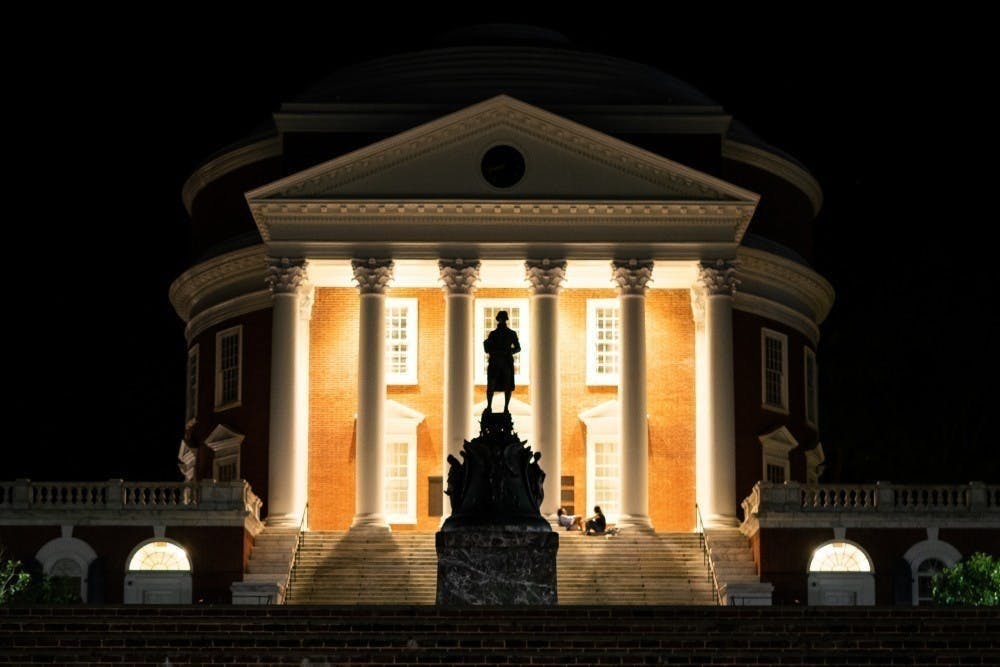Lea en español
At the meeting of the full board Tuesday, the Board of Visitors will consider implementing a tuition freeze for most undergraduate students and supporting recommendations made by the recently-established Naming and Memorials Committee.
If the proposed resolution is approved by the Board of Visitors, there will be no changes to tuition and fees for the upcoming 2021-2022 school year for undergraduates. However, this proposal will not change previously approved tuition differentials, such as the BOV’s 2018 decision to increase tuition for both in-state and out-of-state students who entered the College of Arts & Sciences in 2019 by $2,700 tuition for the 2021-2022 school year.
“The Board seeks to keep increases at an affordable level while continuing to meet 100 percent of financial need to invest in recruiting and retaining excellent faculty and instructional delivery,” the proposed resolution reads.
The decision to consider a tuition freeze for undergraduates comes after abundant student advocacy concerning the adverse financial impacts the COVID-19 pandemic has had on many families. Advocating for a tuition freeze was part of the campaign platforms of both candidates who ran for Student Council president last month. According to a survey administered by Student Council this fall, 42 percent of students reported struggling to pay tuition for the 2020-2021 academic year.
The resolution proposes increases of tuition between 0.1 percent and 13.2 percent across the University's graduate programs, with the exception of two graduate programs in the McIntire School of Commerce, which will see slight decreases.
The University last implemented a tuition freeze for in-state undergraduate students during the 2019-2020 academic year, after receiving a $5.52 million increase in state funding that offset the originally planned tuition increase of 2.9 percent.
The Board of Visitors originally planned to consider changes to tuition at its March meeting, but delayed the decision due to unfinalized aspects of the Commonwealth’s 2020-2022 budget.
While no changes are planned for tuition and fees, the resolution proposes a slight increase in housing rates — between a 1.95 percent increase for first-year undergraduates to a 4.82 percent increase for upperclass students living in single rooms at Hereford Residential College. The resolution also proposes dining rate increases between 1.52 percent and 3.4 percent, depending on a student’s meal plan.
The resolution also proposes a $114 increase in the mandatory non-educational and general fee, $75 of which will go towards Student Health — this is a part of a four-year plan to increase service offerings and expand facilities.
The Board will also consider a resolution in support of recommendations made by the Naming and Memorials Committee. The Naming and Memorials Committee was established by the University in February with the goal of establishing protocols for naming — and in some cases, renaming — buildings on Grounds as well as making recommendations on contextualizing memorials.
According to the resolution, the Naming and Memorials Committee concluded a digital contextualization of the University's statues and memorials will help visitors and residents understand the history of U.Va. and of the U.S. with “greater capaciousness, nuance and complexity.” As such, the committee has recommended the University create a “digital historical stratigraphy” that will “afford a balanced and fulsome experience, enabling all who visit our Grounds to develop their own informed perspective.”
“It is our hope that, by digitally contextualizing statues and memorials, the University will accord them new expressive power and pedagogical purpose,” the Naming and Memorial Committee's recommendation reads. “Helping to cultivate a deeper sense of the past will, we hope, inspire both residents and visitors not only to greater empathy, but also to considered thought about their own role in making history in the years to come. ”
The recommendation notes that both the number of statues and memorials on Grounds and their physical situation does not make widespread contextualization using markers a “practicable option” due to the complexity of the statues’ and memorials’ histories.
Specifically, the recommendation says any digital contextualization should tell the history of the decision to commission, fund and build the statue in the University community and an “informed treatment” of the artist who created the statue or memorial. The committee has recommended that University President Ryan create a working group of professional historians, students, local residents and alumni to develop the digital contextualization.
If passed, the proposed resolution would mean that the statue of Thomas Jefferson in front of the Rotunda could be contextualized digitally, rather than with a plaque or some other kind of added visual element. The Board of Visitors first voted to contextualize the statue last fall.
The Naming and Memorials Committee is chaired by Michael Suarez, English professor and executive director of the Rare Book School. Other members of the committee include various faculty, alumni administrators and the student BOV member.
The meeting of the Board of Visitors will take place from 4 to 5:10 p.m. Tuesday and can be accessed online.







